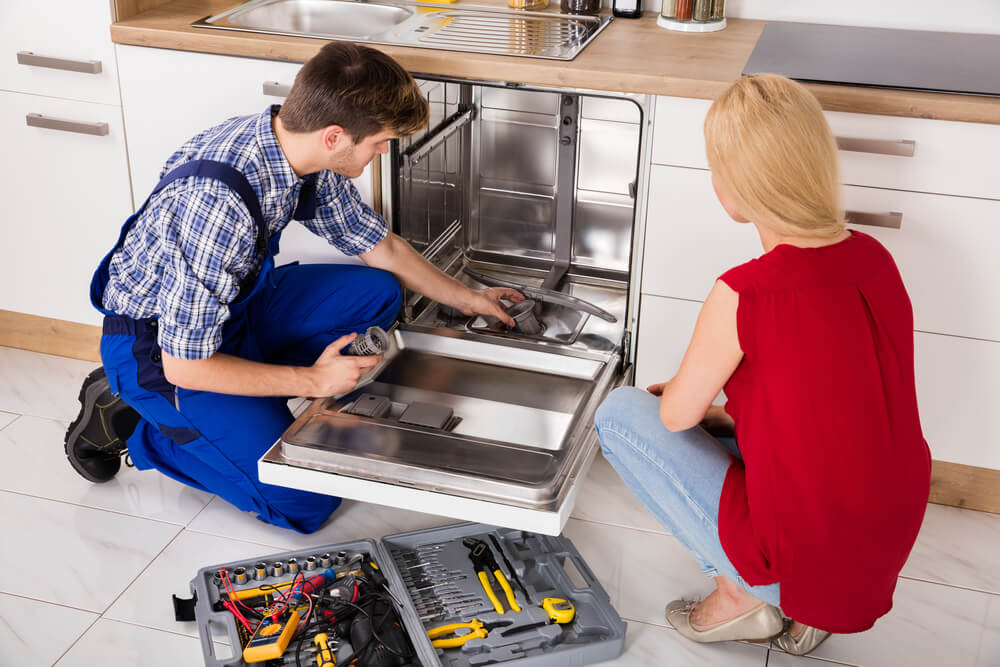How much does it cost to repair a dishwasher?


A broken dishwasher can be an incredible drag – when not in use they are susceptible to all sorts of molds and deteorations. The cost to get a dishwasher repaired can vary dramatically. According to local experts Green Bay Appliance Repair, who specialize in appliance repair in Green Bay, it typically ranges anywhere from $100 to $200.
Unlike a clothes washer, a dishwasher uses only around 2 to 3 gallons of water. This water mixes with the detergent and is pumped around the interior with the rotating spray arms. This water then drains and the process starts again – often several times over a typical session.
Why does the cost vary so much?
There are many different things that can go wrong with a dishwasher, a complete failure is among them but many more minors things can happen too. This can range from anywhere to mildly annoying to a potential breakdown.
What are some of the minor problems that a dishwasher can face?
Often times the dishwasher won’t just stop working all at once – smaller breakdowns can make the machine not do things as well – with problems like wet dishes, detergent residue, and food in the filter being some of the most common problems.
What are the causes of these problems?
When it comes to the dishes still being wet it is usually a worn out heating element that is the culprit. A dirty filter can work less efficiently, causing food particles to stay on dishes, while a damaged dosing chamber can lead to detergent residue clinging to the dishes.
When comes to any appliance repair you should have a certified contractor come out to look at it. If you are unsure if the person you are hiring is legal to work on a dishwasher either ask for their credentials or look them up via online websites such as the Better Business Bureau.
The person I’m talking to said they would do a free estimate – is this too good to be true?
The caveat here is that you have to agree to their estimated repair cost – you can expect a $50 to $75 trip charge if you decline their service. While it’s good to shop around to get a fair price, you should avoid too many of these free home estimates if you can.
Is it possible to do any of the repairs myself?
Yes! If you find yourself a little handy and have the right tools laying around fixing a dishwasher isn’t entirely too difficult. These machines aren’t entirely too complicated and it is often a few specific issues they face that you can diagnose with a little troubleshooting.
So the dishwasher isn’t running, what do I do to fix it?
Make sure everything is hooked up how it is supposed to – it may seem common sense but make sure that the power is on and everything is properly engaged. From here you need to make sure that the GFCI that it is attached to is working.
I did all that but it’s still not starting!
That’s okay there are a few other spots you can check out. Look at the electrical panel to see if there is a tripped breaker or blown fuse. If all the power is still running toward the machine but nothing is happening chances are you have some sort of defective switch.
What if the dishwasher isn’t filling?
Just like with a lack of power make sure to go to the source first – in this case, the water supply should be checked to see if it is running. Try to make sure that it is opened by turning it all the way counterclockwise.
I’m still having issues with the water levels.
In that case, you need to wait after the dishwasher is sufficiently cool – check the small plastic dome that mounted at the base, typically near the front. This float should click up and down easily – if not it may need to be disconnected and cleaned.
How do you check the water inlet valve?
Shut off the hot water valve then located the actual inlet valve that is typically located behind the bottom front panel. Look for the screen and clean it as well as possible. If the screen appears clear but the dishwasher isn’t filling, you probably have faulty parts.
What about water hardness?
The hardness of your water – or the number of grains of minerals per gallon of water, measured in parts per million – can potentially damage your dishwasher if you aren’t careful. Any water that is over 10.5 grains per gallon is considered hard and can create deposits in the pipes.
There are many minor problems a dishwasher can face such as noisy, lack of draining, along with not filling up all the way. While these problems can be multifaceted they are possible to do yourself – with professional services typically requiring around $100 to $200.